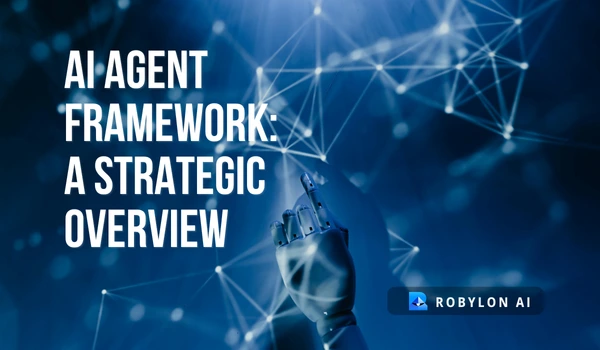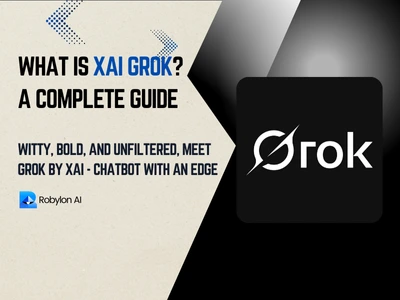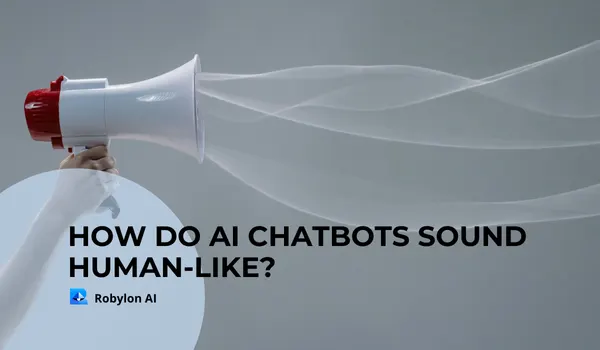TL;DR : AI Agents vs Traditional Automation Tools
AI agents are revolutionizing how businesses operate by offering intelligent automation, real-time decision-making, and hyper-personalization. They are goal-driven systems that perceive → decide → act, improving with every interaction. Traditional software and rule-based automation tools execute predefined steps and only change when humans reconfigure them.
This guide explains how AI agents differ from traditional software and automation, where each wins, and how to choose for small businesses, automation, analytics, and customer service.
See AI agents live in action. Book a demo.
Introduction: Evolution from Traditional Software to AI Agents
In today’s rapidly advancing digital landscape, the line between conventional software and intelligent systems is becoming increasingly blurred. Businesses are shifting from static, rule-based software applications to dynamic, learning-based AI agents that can understand, adapt, and act independently.
But what exactly separates an AI agent from traditional software? In this blog, we explore the core differences between the two, highlighting how AI agents are redefining automation, decision-making, and user experiences in 2026 and beyond.
What Are AI Agents and Traditional Software?
AI agents and traditional software may appear similar on the surface; both perform specific tasks but they differ fundamentally in how they operate, adapt, and scale. The core distinction lies in adaptability: AI agents are designed to learn, evolve, and optimize their performance, while traditional software remains static, requiring manual updates and rule-based instructions.
What Are AI Agents?

AI agents are autonomous software systems that independently tackle tasks, decide, and interact with users or their surroundings. Powered by machine learning and natural language processing, these agents are capable of adapting over time based on data and context.
Components and Capabilities
- Autonomy: Minimal human input required
- Learning: Adapts based on new data and past interactions
- Goal-orientation: Users set the goal, and the agent selects the best course of action
- Versatility: Can operate in both simple and complex environments
- Ease of Use: Seamlessly connect with third-party tools and external data sources
Examples of AI Agents
- Conversational agents like ChatGPT or Gemini that handle customer queries
- Virtual assistants like Siri and Alexa that perform tasks using voice commands
- Automation bots like Robylon AI that manage customer queries, analyze documents, or execute workflows
These agents not only understand natural language but also deliver real-time responses, adapt to user behavior, and reduce operational costs for businesses.
AI agents represent the evolution of AI systems. Unlike traditional systems, these agents perceive, learn, and act within their environments. They’re capable of dynamic decision-making, making them ideal for tasks that require contextual understanding, flexibility, and continuous improvement. Get detailed insights about “what AI agents are and why they matter”.
What Is Traditional Software?

Traditional software consists of rule-based systems designed to carry out specific, predefined functions. These applications follow a structured logic path and require user inputs to function. They don’t adapt to new data or changing environments unless developers manually update or reconfigure them.
Characteristics
- Static and rule-driven
- Limited flexibility and responsiveness
- Requires frequent manual updates and maintenance
- They lack the capability to learn or improve on their own over time
Examples
- ERP systems for resource planning
- CRM tools to track customer relationships
- Accounting software for financial management
While reliable in structured environments, traditional software lacks the intelligence to handle ambiguous tasks or dynamic workflows.
Learn what AI changes for traditional businesses in 2026.
AI Agents vs Traditional Software [Key Differences]
AI agents and traditional software serve overlapping goals but differ fundamentally in their design, capabilities, and performance. Understanding how these two approaches diverge is crucial for businesses evaluating which technology best fits their needs in a rapidly evolving digital landscape.
Below is a detailed breakdown of the major differences across core dimensions
1. Scope and Functionality
Traditional Software: Designed to perform predefined, static tasks. For example, billing software is built solely for invoice generation and payment tracking.
AI Agents: Go beyond fixed tasks; they manage dynamic workflows, interact with APIs, and coordinate across tools. A project management AI agent might reassign resources based on shifting timelines or real-time progress.
Key Difference
AI agents support complex, goal-driven operations, while traditional software operates in linear, task-specific silos.
2. Autonomy, Adaptability & Decision-Making
Traditional Software: Follows hardcoded logic and conditional rules. It performs reliably in controlled environments but struggles with unstructured data or unexpected inputs. Adapting to new conditions requires manual updates.
AI Agents: Are autonomous and proactive. They make real-time decisions using cognitive reasoning frameworks (e.g., Reason-Action, Chain of Thought), learn from experience, and evolve with every interaction. For example, a customer support AI continuously improves through user feedback without developer intervention.
Key Difference
AI agents are self-learning, adaptive, and goal-driven. Traditional software is static and reactive.
3. Architecture and Design Approach
Traditional Software: Built on procedural logic with predictable workflows. Changes require redevelopment and redeployment.
AI Agents: Built using advanced AI architectures like machine learning, neural networks, and NLP. These agents operate in feedback loops, allowing them to improve performance continuously over time.
Key Difference
AI agents are built to be context-aware and continuously evolve. Traditional software requires manual tuning.
4. User Interaction and Experience
Traditional Software: Offers structured UIs, forms, buttons, and dropdowns with no real contextual intelligence.
AI Agents: Provide intuitive, human-like conversational experiences. They understand natural language, adapt to user preferences, and respond in real time.
Key Difference
AI agents enable rich, personalized interactions. Traditional tools rely on rigid interfaces.
5. Scalability, Maintenance & Updates
Traditional Software: Scaling up often demands significant infrastructure changes and manual updates. Maintenance cycles are developer-driven and costly.
AI Agents: Are cloud-native, modular, and self-improving. They scale easily via APIs, auto-tune themselves, and adapt without human intervention.
Key Difference
AI agents scale effortlessly and maintain themselves. Traditional apps need manual engineering to grow or adapt.
6. Use Cases Across Industries
Traditional Software: Best suited for repetitive, rule-based tasks such as payroll processing, accounting, and inventory tracking.
AI Agents: Excel in dynamic, high-context environments that involve learning, personalization, and decision-making.
Examples
Industry Applications
- Healthcare: Diagnose conditions from scans, suggest treatments, automate clinical workflows
- Finance: Detect fraud, manage portfolios, deliver predictive insights
- E-commerce: Personalize shopping journeys, recommend products, forecast demand
- Automotive: Power self-driving features, monitor vehicle health, optimize navigation
- Web Design: Automate layouts, improve UX, and optimize content for SEO
Key Difference
AI agents are optimized for intelligent, evolving use cases. Traditional software fits well in predictable, routine workflows.
Turn “we should try AI” into real outcomes this year. See where legacy workflows gain speed, accuracy, and ROI: customer service reimagined
Comparison Table: AI Agents vs Traditional Software
Want to explore real-world tools that bring these AI agent capabilities to life? Check out our guide to the Top AI Agents of 2026: The Future of Digital Workflows
Pros and Cons of AI Agents vs Traditional Software
Deciding between AI agents and traditional software depends on your business’s operational requirements, scalability objectives, and data ecosystem. Let’s explore the core advantages and limitations of each.
Pros of AI Agents
AI agents offer a new level of automation and intelligence that goes beyond conventional systems.
- Real-time decision-making: Quickly analyzes incoming data and reacts without delay.
- Automates complex tasks: Handles workflows that require human-like reasoning.
- Hyper-personalization: Delivers tailored customer experiences.
- Boosts operational efficiency: Runs 24/7 without breaks, fatigue, or downtime.
- Scalable performance: Adapts effortlessly to rising workloads.
Looking to implement automation that evolves with your business? Learn how to build an AI agent that integrates directly into your operations.
Cons of AI Agents
Despite their benefits, AI agents do come with certain trade-offs.
- Higher initial cost: Development, training, and deployment can be expensive at the start.
- Ethical concerns: Potential for biased decisions if trained on flawed datasets.
- Data dependency: Requires large volumes of clean, high-quality data to perform reliably.
Example: An AI-based hiring system may unknowingly perpetuate bias if trained on historical data that reflects discriminatory practices, a risk less likely with rule-based software.
Pros of Traditional Software
Traditional software remains widely used for its simplicity, reliability, and cost-efficiency.
- Lower upfront investment: Affordable for small businesses or basic needs.
- Established reliability: Trusted, well-tested systems for routine operations.
- Minimal data privacy risk: Doesn’t require sensitive personal data to function.
- Stable and predictable: Ideal for compliance-heavy industries.
- Ease of implementation: Quick setup with low technical overhead.
Example: A local café might use traditional POS software to handle reservations and inventory with no need for AI's complexity or cost.
Cons of Traditional Software
However, traditional software has limitations that can hinder growth and innovation.
- Rigid functionality: No ability to learn or improve over time.
- Requires manual updates: Frequent maintenance and human intervention.
- Struggles with big data: Can’t process unstructured or high-volume data efficiently.
- Limited scalability: Fails to maintain consistent performance at scale.
- Lacks personalization: Can’t deliver tailored experiences at scale.
Example: A customer service system built on traditional rules may need frequent manual updates for new queries, unlike an AI-powered agent that evolves automatically.
Which Is Right for Your Business?
The decision ultimately depends on your business model, goals, and data maturity.
When to Choose AI Agents
If your business handles large volumes of data, needs real-time insights, or demands high personalization, AI agents are the way to go.
- Ideal for: Finance, healthcare, e-commerce, SaaS, or customer-facing industries.
- Why: AI agents spot trends, automate decisions, and scale intelligently.
- Use Case: A fintech company analyzing thousands of transactions daily can use AI agents to detect fraud and forecast risks in real time.
When to Stick with Traditional Software
For businesses with predictable workflows or limited data needs, traditional software may still be the right fit.
- Ideal for: Legal firms, small service businesses, logistics, or compliance-heavy sectors.
- Why: Simpler systems are easier to maintain and cost-effective for rule-based processes.
- Use Case: A law firm might prefer structured document filing with complete manual control over the logic.
The Future Potential of AI Agents

AI agents are no longer just tools, they are becoming intelligent collaborators that will redefine how businesses operate. As technology advances, AI agents are evolving to become more autonomous, adaptive, and seamlessly integrated into everyday workflows.
Make code reviews and tests less painful. Meet the top AI coding agents of 2026 that boost speed without breaking standards.
Conclusion: Why AI Agents Are the Future
The shift from traditional software to AI agents marks a new era of intelligent automation. With the ability to learn, reason, and interact more naturally, AI agents go beyond executing commands they become collaborators in achieving business goals.
Choose traditional software if your work is highly regulated, rule-stable, and form-driven. Choose AI agents if you need real-time decisions, unstructured data handling, personalization, or cross-tool orchestration. Most teams run a hybrid: traditional system of record + AI agents for the front-line work.
Ready to modernize your business operations?
Discover how Robylon can help you build intelligent, scalable AI agents that outperform traditional software.
FAQs
What’s the ROI of using AI agents?
AI agents deliver strong ROI through improved efficiency, lower support costs, real-time automation, and better user experiences at scale.
Is traditional software becoming obsolete?
Not entirely. Traditional software remains valuable for routine, rule-based processes where predictability, stability, and compliance are key.
What are some real-world applications of AI agents?
AI agents handle tasks like customer support, lead qualification, fraud detection, and document analysis across industries like finance, healthcare, and e-commerce
Do AI agents require constant retraining?
No. Most AI agents self-learn and improve through ongoing interactions, minimizing the need for manual retraining or reprogramming.
Is it possible to integrate AI agents into my existing workflows?
Absolutely. AI agents are built to integrate with CRMs, helpdesks, and APIs, allowing them to extend and enhance your existing systems.
Are AI agents suitable for small businesses?
Yes, many platforms like Robylon AI offer low-code tools, making it easy for small teams to deploy and benefit from intelligent automation without heavy investment.
What sets AI agents apart from traditional software
AI agents are dynamic systems that continuously learn from data and respond in real time. Traditional software, on the other hand, operates on predefined logic and must be manually reprogrammed to handle new scenarios.





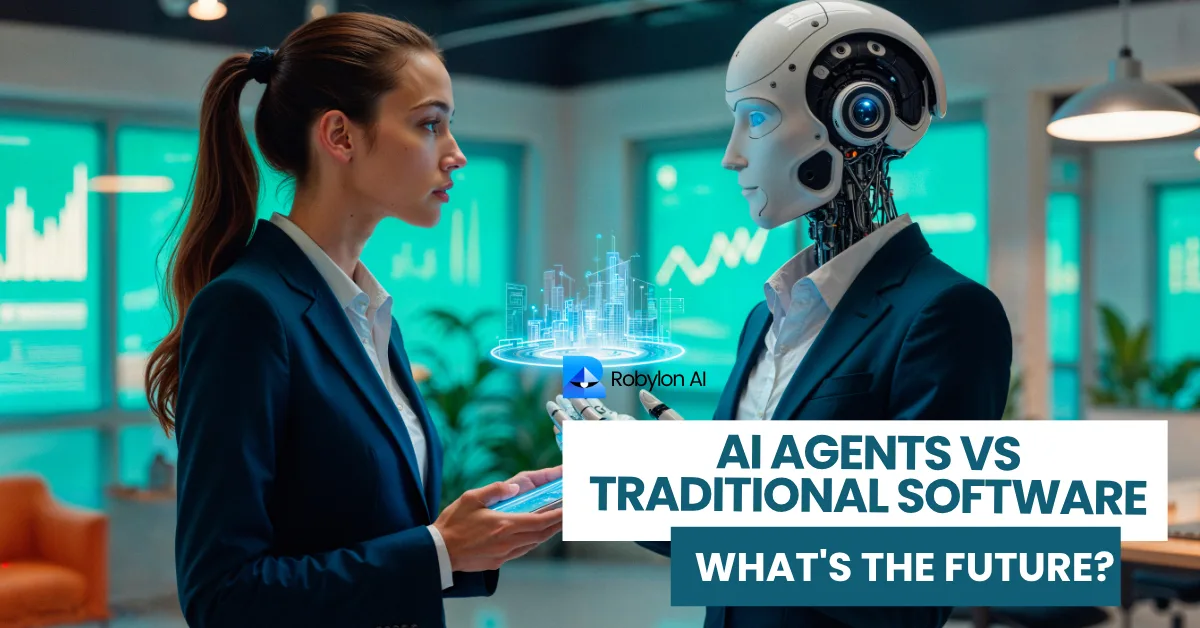
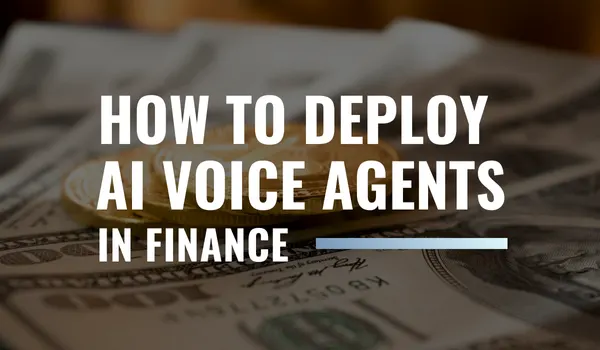



.png)
